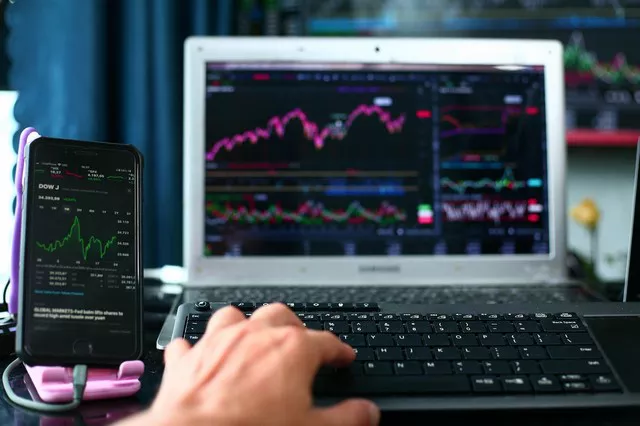The stock market, a dynamic and integral component of the global financial ecosystem, has been an avenue of wealth creation, capital allocation, and economic growth for centuries. As technology advances and societal shifts reshape the way we interact with the financial world, the future of the stock market is a topic of significant interest and speculation.
1. Technological Disruption and Digital Transformation
The future of the stock market is inextricably linked with technological advancements that continue to redefine the way we trade, invest, and interact with financial assets. The rise of digital platforms, algorithmic trading, and high-frequency trading has already transformed the market landscape. Looking ahead, innovations such as blockchain technology and artificial intelligence (AI) are poised to have a profound impact.
Blockchain technology, known for its decentralized and secure nature, has the potential to revolutionize stock market infrastructure, enhancing transparency, reducing settlement times, and minimizing counterparty risk. Smart contracts enabled by blockchain could streamline trade execution, automate regulatory compliance, and provide real-time settlement.
AI-powered algorithms are reshaping trading strategies and market analysis. Advanced machine learning algorithms can analyze vast amounts of data, detect patterns, and generate predictive insights, enabling traders and investors to make more informed decisions. The integration of AI into stock market operations could lead to greater efficiency, accuracy, and improved risk management.
2. Regulatory Evolution and Investor Protection
Regulatory frameworks play a pivotal role in shaping the conduct and integrity of the stock market. The future of the stock market will likely witness regulatory adaptations to address emerging challenges, technological advancements, and investor protection. Regulatory bodies will need to strike a balance between fostering innovation and ensuring market integrity.
Market surveillance and enforcement may leverage advanced technologies to detect and prevent market manipulation, insider trading, and other illicit activities. The implementation of stricter cybersecurity measures will become increasingly crucial to safeguard market data, investor information, and trading platforms from cyber threats.
3. Democratization of Investing
The future of the stock market is likely to witness a continued democratization of investing, driven by the accessibility of online trading platforms, fractional ownership, and the rise of retail investors. Online brokerage platforms have empowered individuals to invest in stocks with ease, offering commission-free trading, user-friendly interfaces, and educational resources.
Fractional ownership allows investors to purchase fractions of shares, making it possible to invest in high-priced stocks with limited capital. This trend could lead to a broader and more diverse investor base, enabling individuals from various socioeconomic backgrounds to participate in the stock market.
4. Sustainable Investing and ESG Integration
Environmental, Social, and Governance (ESG) considerations are gaining prominence in the investment landscape. The future of the stock market will likely see a growing emphasis on sustainable investing, where investors prioritize companies that demonstrate positive ESG practices and contribute to societal and environmental well-being.
As investors increasingly factor ESG criteria into their investment decisions, companies will be incentivized to adopt sustainable practices and enhance transparency. Stock exchanges may develop ESG-related indices and products to cater to the growing demand for responsible investments.
5. Globalization and Market Integration
The future of the stock market is likely to be influenced by continued globalization and interconnectedness. Advances in communication, transportation, and information technology have facilitated cross-border investment and trading. Stock exchanges around the world are collaborating to provide seamless access to international markets.
Investors can expect enhanced opportunities for diversification and exposure to different economies, sectors, and industries. The integration of global markets may also lead to increased competition among exchanges, resulting in innovations, cost efficiencies, and improved services for investors.
6. Evolving Investor Behavior and Education
Understanding investor behavior is paramount to predicting the future of the stock market. As new generations of investors enter the market, their preferences, values, and investment approaches will shape market dynamics. Millennials and Gen Z investors, for instance, may prioritize impact investing, digital engagement, and portfolio customization.
The availability of robust educational resources and financial literacy initiatives will be essential to equip investors with the knowledge and skills needed to navigate the complexities of the stock market. Brokerages, financial institutions, and educational institutions may collaborate to provide comprehensive financial education to investors of all ages.
7. Economic Trends and Macroeconomic Factors
The future of the stock market is inherently tied to broader economic trends and macroeconomic factors. Economic growth, inflation rates, interest rates, and geopolitical developments can significantly impact market sentiment and performance. Central bank policies and fiscal stimuli may influence investor decisions and market volatility.
Technological disruptions, such as automation and shifts in industry landscapes, can lead to sector rotations and changes in market leadership. Investors will need to stay attuned to economic indicators, geopolitical events, and structural changes that can affect market fundamentals.
Conclusion
The stock market, as a dynamic and ever-evolving entity, holds the promise of continuous transformation in the years ahead. Technological innovations, regulatory adaptations, changing investor behaviors, and economic trends are likely to shape the future of the stock market. As investors and market participants navigate this evolving landscape, they will need to embrace new tools, strategies, and perspectives to seize opportunities, manage risks, and contribute to the growth and prosperity of the global economy.


